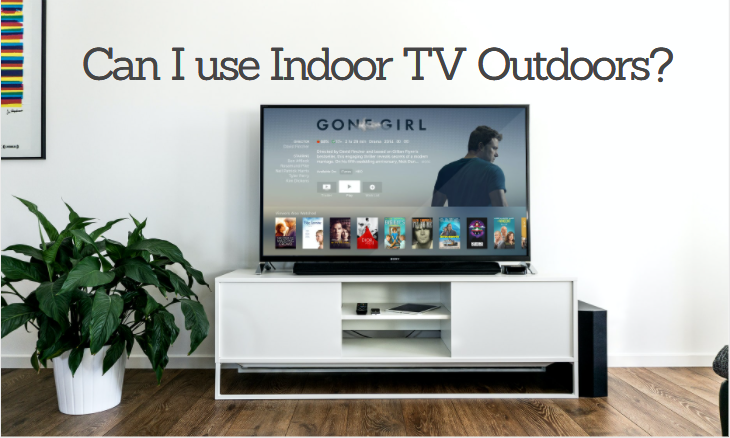Can I use my indoor tv outdoors? Is this question stopping you from carrying your TV outdoors? Watching TV outside is an amazing idea to have a great time, but should you use your indoor tv outdoors?
Without beating about the bush, here is the short answer:

Can I Use Indoor TVs outdoor?
Yes, you can use and carry a TV outdoors, but it requires a high level of protection. To carry a tv along with you, it needs to be fully equipped with a safety cover. Moreover, the weather also has a pretty strong role in this decision. If the weather outdoors is fine, you might not face any issues. However, if the weather is stormy or rainy, you must need a sturdy shelter to take your TV outside.
Since now you have got the answer, you might also want to check our guide on the Best Indoor TV For Outdoor Use.
Further in this article, I’ve discussed some amazing facts about indoor tv and how you can make it possible. So read the blog post till the end.
Difference between an indoor and outdoor tv
Indoor Tv
Indoor TVs are sensitive and manufactured according to room temperature. As a result, indoor TVs are weather-sensitive, have less moisture control, and the brightness gets low in sunlight. Moreover, the price of an indoor tv is low compared to outdoor tv.
Outdoor TV
Outdoor TVs are less sensitive and manufactured outdoors like camping, scouting, etc. In addition, outdoor TVs have moisture absorption and temperature maintaining technology. Outdoor TVs are the best TVs for bright rooms due to their high brightness. That’s why they are quite expensive than regular indoor TVs.
How to Make an Indoor TV an Outdoor TV
Using a regular TV outside is a good idea, but it needs some precautions to avoid problems. You might have a shelter to place your tv outside, but there are still some elements to consider; otherwise, you can be in trouble.
Consider the placement
The placement of mounting a tv is one of the crucial elements to prevent glare and direct sunlight. Therefore, your outside location matters a lot regarding where you are hanging the TV to get complete shade throughout the day.
Know the weather rating
Weather can make or break your adventure if you underestimate it. Be sure to check the weather rating of your TV before you purchase it. You wanted to go outside in winter and summer that you keep changing as per desire. But you won’t like to buy two separate TVs for different weather conditions.
That’s why you must need a TV with an adjustable temperature rating. So you can increase or decrease the rating as per the condition.
Cover your tv
Wrap your tv with a transparent plastic sheet cover that can protect your tv from getting dirty. The benefit of using a transparent cover is that you can enjoy watching tv while on. Moreover, the cover will help get rid of from TV’s moisture and save it from dust particles.
Take a tv stand mount.
Outside, while camping, you might not find any wall support to mount your tv; that is why having a tv stand that can hold your tv firmly is helpful.
Usually, it gets tough to protect the tv when the weather condition is not good, and fast air is blowing outside, so to avoid any expansion and contraction, make sure to protect the tv with a stand.
Use inside the camp is preferred.
Watching an indoor tv outside is perfect in a tent because it will save your tv from a different perspective. Like, outside dirt, sunlight that can affect tv brightness, a room atmosphere, and sound will be clear in a tent.
Take a tv cabinet if possible.
Only follow this method, and you are free from any other condition. A save and closed tv cabinets are a great option to use tv outside. All the tv cabinets are properly sealed with caulk and completely weather protected. They also restrict moisturization from coming inside the cabinet.
Moreover, if a tv cabinet is equipped with tires, it will be easy to carry your tv. The only issue you might face is having a cabinet while camping. They might be expensive and occupy a large space in your vehicle. So consider it too.
You may also want to check our list of the best TVs under $1500.
Safety precautions to use an indoor tv outside
I’ve compiled some potential points to consider when using a normal tv outside. Follow these instructions, and you’ll get benefits:
- Shed: use your tv under the shed to protect your tv from extreme cold and heat.
- Enclosure: while carrying your tv outside, keep it in an enclosure to keep it safe from dust, debris, and internal screen breakage.
- Please keep it safe: having an outdoor tv increases the chances of theft. You might leave the tv unattended, which can cause stealing. While sleeping, save your tv in trunk if you carry with you, or keep it aside in the tent.
- Only use in shelter: using tv under the sky can put you in trouble and waste money. Weather can change at any time, so protect tv from rain, snow, cold and hot wind. So always make sure you watch tv in the tent.
- Electricity: indoor tv uses less power than any other electric product. Outdoor, you might have an electric generator which might be a DC power. So use an inverter for AC power to TV to prevent fusing.
So, these are some of the most important threats you must have to follow to make your outdoor tour happy. Neglecting them can cost you more.
Final Verdicts
In conclusion, using indoor tv outside can be challenging and tough. I would recommend that if you’ve extreme convenience and comfortable vehicles for traveling, there is no issue to use regular tv outside until you follow the right measure to protect the tv.
I won’t recommend you buy an expensive tv, especially outdoor, that doesn’t have much difference from a normal tv. Instead, you have to pay extra money for that. But, especially when you are in a place where the weather stays calm and clear, where the temperature doesn’t change suddenly, you might be in luck.
If unlucky you’re living in an area where the weather remains cloudy and rainy, you have to take all the safety precautions, but you can use indoor tv outdoors.

